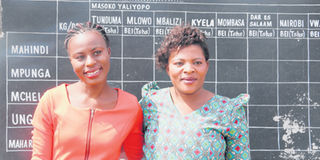I want her to always remember that the jembe is our livelihood

Bahati Hamadi (right) and her daughter Rehema Mwaibambe stand outside the building of their Farmers Organisation building and warehouse in Kyela. PHOTOI BELINDA JAPHET.
What you need to know:
- But the two women maintain a quiet grace amid the chaos and introduce themselves with identical deep but soft tones. We sit under a large tree trunk and Rehema begins recording her mother on her phone; a proud smile on her face.
Mother and daughter, team Bahati Hamadi and Rehema Mwaibambe meet us on the outskirts of rural Kyela in Southern Tanzania, an area known for its top agricultural production. There is a strong wind blowing in sand from a road under construction a few metres ahead.
But the two women maintain a quiet grace amid the chaos and introduce themselves with identical deep but soft tones. We sit under a large tree trunk and Rehema begins recording her mother on her phone; a proud smile on her face.
The two make up a collage of different women I have met on my journey through the southern region of Tanzania. They are strong, enthusiastic and making the best of both structural and economic limitations towards a better future for themselves and their families.
Like many in the region, Bahati was raised in a farming household. But the years have changed what was once a sustenance activity into a potentially highly lucrative business sector. Unlike her parents, Bahati is thinking about not just growing food for family but about business. After the years of experience de-weeding and planting maize fields with her mother, Bahati needed to use her skills and land to generate an actual income:
“ I started farming because I couldn’t just sit back and wait for someone else to provide for me. I have been farming for most of my life but I became a professional farmer two years ago.”
It was during this period that Bahati was almost forced to take up the jembe, she recalls this “as a very tough time. My daughter (Rehema) who had finished with school had to go to university, but I just looked at her with my empty hands. I had nothing to take her to school with. You can imagine what this did to me as a parent.”
After years of toiling as a solo farmer, the desperate mother decided to join the farmers’ organisation in Kyela. She recalls the initial support she gained from joining the collective, “it really gave me the confidence and financial support to begin this venture. I was able to apply for a small loan, and buy supplies like pesticides and fertiliser on credit. It also helped me learn about new farming methods. You see, we were still using very outdated growing methods which made farming more laborious than it is now.”
Within a short period of time, Bahati was able to utilise what she had learned at the farmers’ organisation. And what she had learned had allowed her to almost triple her maize and bean production. Bahati also enjoyed better financial security after pooling in her crops with her fellow members to sell on the market as a collective.
Like the many other women farmers of Tanzania, Bahati is finding that she is a natural at the business of farming.
Her God given green thumb, her instinct to be a good mother and a growing ambition for financial independence all feed her growing hunger to join the business of farming.
“We are finding out that we are really good at this business. And now farming has become easier. What used to take one week can be done in a matter of hours. I remember my mother would have to de-weed the farms using her hands, it would take whole weeks by the time they finished more weeds were growing where she had started.”
The decreased labour intensive nature of farming has now opened up the door to women who were previously intimidated by the heavy duty manpower it took to prepare, plant and harvest fields.
The area’s head farmer and farming organisation leader, Anthony Mwamatenge agrees: “It’s more about brainpower now, it’s part of the business world. You have to learn to build networks with buyers and salesmen. It’s also about learning to keep your books and keeping to a tight budget, this is something many women are obviously very good at, so that’s why we are seeing more and more successful women farmers.”
But there are powers beyond a woman’s control. Changing weather conditions for one prove a worthy adversary. Bahati is weary of the changing climate, she looks about her and worries about the coming planting season. “ You see right now it’s so dry, but we’re preparing the fields for planting mid November, we’re hoping it will rain, but if it doesn’t, we will have a few problems. Last year’s rains were also not good to us. I lost much of my maize crops to the drought and harsh sun.”
Like any other farmer, Bahati knows that nothing is assured until the crops are bagged and sold. Even then, the nature of the market is as changeable as the weather. The price of a sack of maize fluctuates as much as the sun rises and drops from the sky. In fact, more than the issue of climate change, this issue is the chip on many a farmer’s’ shoulders.
So in light of the somewhat precarious nature of the farming industry, I ask Bahati why she would strongly encourage her daughter to be a farmer. “I want her to be educated and pursue any career she wants, but I want her to always remember that the jembe is our life. With her business degree she will be even more fortunate than I was. She will be able to run her farm as a proper business, which is something I am only learning to do in my later years,” Bahati assures me.
The truth is she doesn’t have to push her daughter that hard at all. Rehema is already involved in helping her mother run the farm and has even come up with a business plan to lease 2 to 3 acres from her mother so she can start her own bean and nut farming business.
“For me this is the best way I know to support my family. I want to work in an office but I also want to keep farming because it will give me the financial security to keep growing,” Rehema says.
The mother daughter duo remain optimistic and are now preparing the fields for planting and carefully shopping around for an irrigation pump. Once they have one, they will be able to dodge the effects of drought.
“You saw all the rivers and streams on your way here? There is no reason for our crops to go dry when these rivers are flowing, the stress of waiting for the rains be gone!” she says explaining that she will be able to store and transport water from nearby sources to water her crops relatively cheaply. This is at the top of Rehema’s to do list for the coming year.
From the looks of things the future looks pretty bright for both Bahati and Rehema. Don’t let their soft, uncalloused hands fool you, these women plan to reap what they have sowed.
Email: [email protected]



